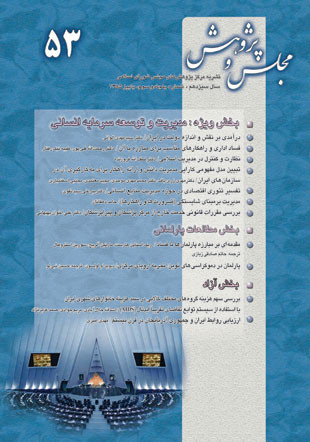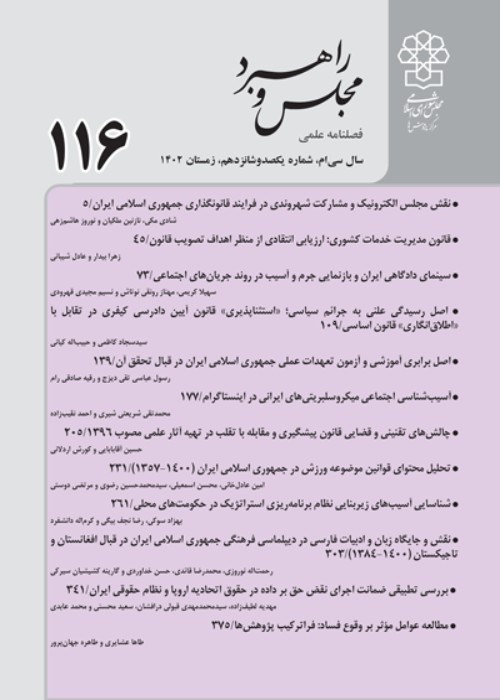فهرست مطالب

فصلنامه مجلس و راهبرد
پیاپی 53 (پاییز و زمستان 1385)
- تاریخ انتشار: 1385/08/23
- تعداد عناوین: 12
-
صفحه 5
- بخش ویژه: مدیریت و توسعه سرمایه انسانی
-
صفحه 55
- بخش مطالعات پارلمانی
- بخش آزاد
-
Page 11The size and macro organization of governments as well as their role and function are among important issues of contemporary countries in the world. There have been different views for solving the structural problems of macro organization if government. Also various theories on tasks,responsibilities, and the extents of state intervention in administrating affairs of a country have been so far presented. This paper categorizes all solutions for making role of government in administration of the country logical posed by different experts in three groups. According the first group of views, the size of government is large because of government's propensity to control. That is why downsizing government should be done through modifying control role of the government as well as through incorporating confidence into society-state relations. According to the second group, the dominant weight of government's propensity to production activities is the main cause of the large size of government and its inefficiencies. That is why the solution is said to be downsizing production activities of government, the strengthening of non governmental organization, and giving affairs to private sector and people. Finally according the third group, the main reason of the lack of harmony in achieving government's main goals is that the structure of government is formed on the basis of its duties. That is why the solution is said to be the promotion of holistic culture and the gradual shifting of the structure of government from its duties into its process. In the end, the paper presents a proper approach to the structure of government and its size in Iran.Keywords: government, privatization, new state management
-
Page 33Almost all countries get entangled in corruption in their own administrative system. The corruption in its various forms usually causes a lot of damage. It is necessary for a country which is stepping toward development and progress to do so without getting entangled in corruption, as well as to fight against causes of corruption for preventing from its damages in future so that sustainable development cab be achieved in a uncorrupted society.This paper studies corruption, its consequences, some approaches to it, and solutions for fighting against it. While describing the situation of corruption in Iran, the paper presents a pattern for fighting against corruption, in which solution for reducing corruption as well as for increasing administrative health are suggested through using multidimensional approaches and strategies with ideological and cultural orientation based on the structure of Iranian Constitution.Keywords: administrative corruption, approaches to fighting against corruption, multidimensional strategies, administrative health
-
Page 55One of tasks of managers is "supervision and control." As studies show, the precise and proper supervision makes for achieving goals of organization as well as for checking deviations. The organizational controls are divided into internal and external controls. The internal control induces one to be somehow selfcontrol.The internal control is essential in the Islamic management.The noun of "piety" on the basis of faithful beliefs is major selfcontrol factor. The control in the Islamic value system is multilateral and sympathetic. In addition to this fact that human being has to be self-control as a task, the cosmos is formed in a way that human being is under control on the basis of his own beliefs from different aspects. The divine control which is complete,precise, and continuance, the presence of two rival angels for recording behaviors, the control of prophets, Imams, and believers, the control of the body's organs, the time's and place's control on the basis of documents of the holy Koran and the sayings are influential factors in making self-control system for believers themselves. This paper studies the concept of self-control, the place of self control in the holy Koran and the sayings, the methods of self-control, and the consequences of self-control.Keywords: supervision, control, self, control, external control, internal control
-
Page 87This paper aims to improve understanding of those processes by which providing knowledge, technical instruments, and astute factors can help to develop organization with regard to spread of knowledge as a systematic competitive weapon. It studies the relations between technology and human values, because these relations are essential instruments in knowledge management process. Considering that knowledge management has something to do with astute factors, information technology, and protection systems of strategic decisions, one finds that knowledge management aims to offer an influential approach to the efficiency of knowledge management. The first part of the paper deals with principal concepts. The second part presents a conceptual model of Knowledge Management Efficiency in those organizations being supported by a mixture of the roles of astute factors and technical instruments. The model is divided into two sections: technical instruments for determining the characteristics of resources of astute systems, and astute factors whose task is to focus on their own role in organizational performance.Keywords: knowledge management, tacit knowledge, explicit knowledge, astute factors, technical instruments, strategic decisions, organizational efficiency
-
Page 105The new state management has replaced the traditional pattern of public affairs administration since the last two decades. In Iran also policymakers in state administration try to use principles of the new state management with a view to the recent trends. Trying to formulate the Civil Service Management Bill as well as to replace it with the Civil Service Law (passed 1966) suggests this issue. The main assumption of the new state management is to economical use from all state resource including human resources. This paper tries to offer a framework for economic management of human resources in state organizations.Keywords: economic management of human resources, personnel performance appraisal, wage, salary, Civil Service Bill
-
Page 117Merit-based management is a coherent and harmonic approach to administration of human capitals in long run, which is formulated on the basis of a common set of merits related to macro strategies in a nation-state. Along this line, establishment of merits system as one of the macro, strategic policies in Iran has been emphasized in the Twenty-Year Perspective Program and the 4th Plane Law.While reviewing conventional approaches to the concept of merit as well as the experiences of other countries in establishing a management system based on merit, this paper studies the place of this issue in the 4th Plane Law, finally analyzing those infrastructures required for achieving a comprehensive merit-based management.Keywords: merit, merit, based management, typology, systemic approach, model of merit
-
Page 151Among major problems in Iranian health system in both before and after victory of the Islamic Revolution are shortage of physician, unjust distribution of physicians in the country, and theconcentration of physicians on the major cities and affluent areas. In order to solve such problems, the law of compulsory service of Physicians and Paramedics in the deprived urban and rural areas was passed with the intention of securing health and justice as well as of reducing deprivation, being exposed frequently to many changes in the recent years. The existing roblems in the health system changed after the Iran-Iraq war and those transformations made in the medical education system. In the 1980s a major problem in Iran was the shortage of physician, while today the problem is unemployed physicians in particular and surplus forces in medical sector in general. Considering the present situation, it seems that appraisal of different initiations and decision to continue them should be made with regard to the present conditions and opportunities. This paper briefly reviews the existing regulations in this regard, their impacts, and the current situation.Keywords: legal service, physicians, laws
-
Page 169
This article studies different issues about important of parliament's role in fighting corruption; especially the social ground of corruption and extensive anti corruption policies on which parliaments according to their regulatory function, can enact required rules to fight with increasing of corruption. In fighting corruption, it is necessary to parliaments to be enjoyed ofprofessional experts, facilities, research agencies and audits. If parliaments cannot control corruption among its members, it will never be successful in national actions against the corruption. Corruption pose harmful impacts on economic growth and development and also indicates weakness of economic, social and political organizations. For this reason a serious attention should be paid to the regulatory mechanism control.
Keywords: Parliament, Legislation, Corruption, Anti -
Page 185This paper studies Central European countrie's parliaments in postcommunist era until 1996, a tempestuous period in which those countries were experiencing a transition from communist system to democratic one. The author tries to construct a holistic approach to these parliaments. In doing so, he first presents the beforementioned systems in brief and offers a historical report from various historical experiences of these countries in order to analysis those contexts from which they rose. After constructing such holistic approach, he studies the parliaments in the transition period in terms of structure, leadership, parliamentary procedure, the organization of the parliamentary election, parliamentary parties and commissions, showing their relations with executive branch. His aim finally is to offer a clear image from the impact of parliament on the transition period as well as from probable impacts of these transformations on structure and procedure of theseparliaments.Keywords: parliament, Central Europe, Communism, election
-
Page 219This paper studies ration of different commodity groups in Iranian urban family basket in the period of 1991 to 2003 on the basis of Almost Ideal Demand System. According to estimation of equations system, the price change of different commodity groups has no significant impact on the main group under the heading of foods, and the demand of this group has no high price elasticity. The price elasticity in the main groups under the heading of foods, medical care, housing, and household furnishings is minus one, which is suggestive of their price inelasticity of demand. Also the cross elasticity of demands of other main groups to the main groups under the heading of transportation and recreation is high. Our estimations show that expenditure elasticity of the group under the heading of housing is less than 1, expenditure elasticity of the group under the heading of foods is 1, and income elasticity of the groups under the heading of transportation and clothing is greater than 1. The latter result shows that families consider the groups under the heading of transportation and clothing as luxury.Keywords: utility, family budget, expenditure elasticity, price elasticity, demand system function, budget ration, price index
-
Page 239As for investigating into the evolution of foreign policy in contemporary Iran, the study of relations between Iran and her neighboring countries is so significant. Among them, AzerbaijanRepublic as northern neighboring country- both in the Soviet Era and after her independence- has always had increasing significance in Iranian foreign policy. Although those constraints originating from the dependence of Azerbaijan to the Soviet Union restricted the development of relations between Iran and Azerbaijan before the fragmentation of the Soviet Empire, the independence of Azerbaijan from the Soviet paved the way for developing relations between Tehran and Baku. In this direction, the role of such factors as common history and culture and good potential for economic cooperation were considered as a major motive for developing relations between two countries. At the same time, the process of development of their relation has faced such important obstacles as the difference between nature of their political regimes, the continuance of disagreements about the proper legal regimes of Caspian See, and opposite geopolitical orientations. These obstacles have had negative impacts in making good relations between Iranand Azerbaijan Republic.Keywords: Islamic Republic of Iran, Azerbaijan Republic, foreign policy


